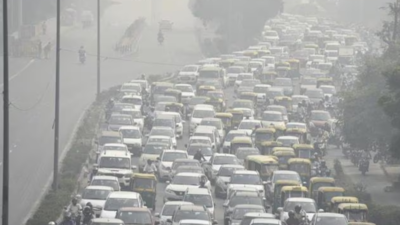
New Delhi: The implementation of the fourth phase of GRAP, which bans BS-3 and BS-4 diesel vehicles, has disrupted travel and traffic, especially for people involved in the wedding business. Delhi’s Central Pollution Control Board implements GRAP-IV measures air quality index (AQI) entered the “severe” category on Sunday.
The restrictions, which come into effect at 8am on Monday, are aimed at curbing pollution caused by older diesel vehicles.
However, this measure had unintended consequences.
Travel agencies report sharp rise in demand for BS-6 and compressed natural gas vehicleincluding cars like Ertiga, Innova and tour buses, are scrambling to fulfill the promises made before the ban.
“this wedding season Added to the pressure. Many vehicles were booked months in advance and we had to make hasty adjustments due to the sudden ban,” said travel agency owner Sewak Tuar.
“We are working on arranging new vehicles that meet petrol, CNG and BS-6 standards as weddings and transport demand are severely affected,” he added.
Another travel agency owner, Aryan Sinha, highlighted the growing challenges
“We have vehicles available for travel to nearby places like Amritsar, but families booking vehicles for destinations like Manali, Mussoorie and Rishikesh and for weddings are facing difficulties,” he said.
Sinha said booking a wedding typically requires 10 to 15 vehicles and takes multiple days. He said managing this demand is challenging as they now have to ensure vehicles meet the required standards.
“For large groups, CNG buses, tour buses and BS-6 compliant vehicles, especially new models after 2020, are in high demand,” he told PTI.
The restrictions have also affected regular tourism, as pollution has prompted many families to plan trips to mountain summer resorts.
Rajesh Kumar, another travel agency owner, said: “This is peak wedding season and many families are planning destination weddings or large gatherings that require bulk bookings. Rescheduling these commitments is costly and disruptive. Our fleet is compliant as we now have to lease additional vehicles or upgrade vehicles.
The shortage has also put a financial strain on agencies, with many reporting losses.
“A large portion of our fleet consists of BS-3 and BS-4 vehicles, which are no longer on the roads. To meet the demand, we have to rent compliant vehicles, which increases the cost,” Kumar added.
Delhi’s air quality index worsened on Monday and Tuesday, crossing 450 and entering the “severe+” range. Although there was a slight improvement on Wednesday, the air quality index remained in the “severe” range.
Delhi-NCR’s GRAP (Graded Response Action Plan) divides air quality into four stages – the first stage is “poor” AQI between 201 and 300, the second stage is “very poor” AQI between 301-400, The third stage is “severe” AQI is 401-450, and the fourth stage is “severe+” AQI exceeds 450.
Many families are booking journeys to hill stations as schools are closed due to pollution. Dharamveer Singh of Pushpur Vihar-based travel agency Kusha Travels said three to four families book tour packages from Delhi every day, with the trips usually lasting three to four days.
“Many families are booking trips to Manali, Mussoorie and Shimla. Vehicles are reserved for only three to four days at a time, further exacerbating the shortage,” Singh said.
According to the CPCB, the air quality index in the national capital was 376 at 9 am. The meteorological department expects shallow fog during the day.







